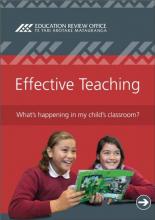Effective teaching - what's happening in my child's classroom?
Effective Teaching - What's happening in my child's classroom? gives parents an insight into teaching practice and includes questions parents can use when discussing their child's progress with the school.
ERO guides for parents have been written for everyone who parents a child - those who have care and responsibility for children attending a school. The booklets include questions you can ask, as well as general information that you may find useful. Click on the booklet to read and download.


